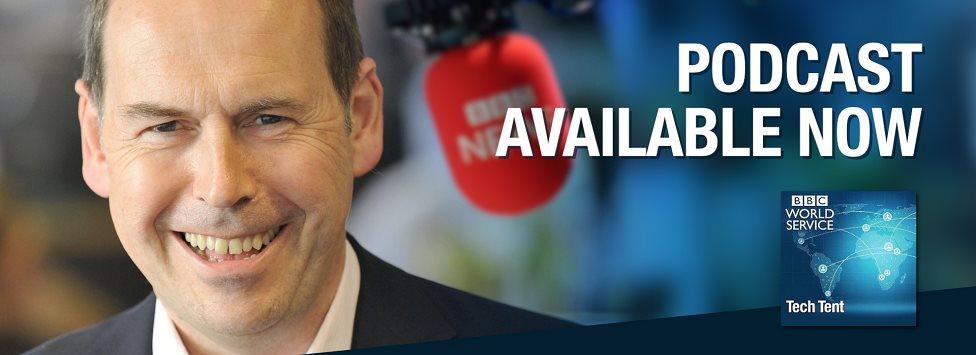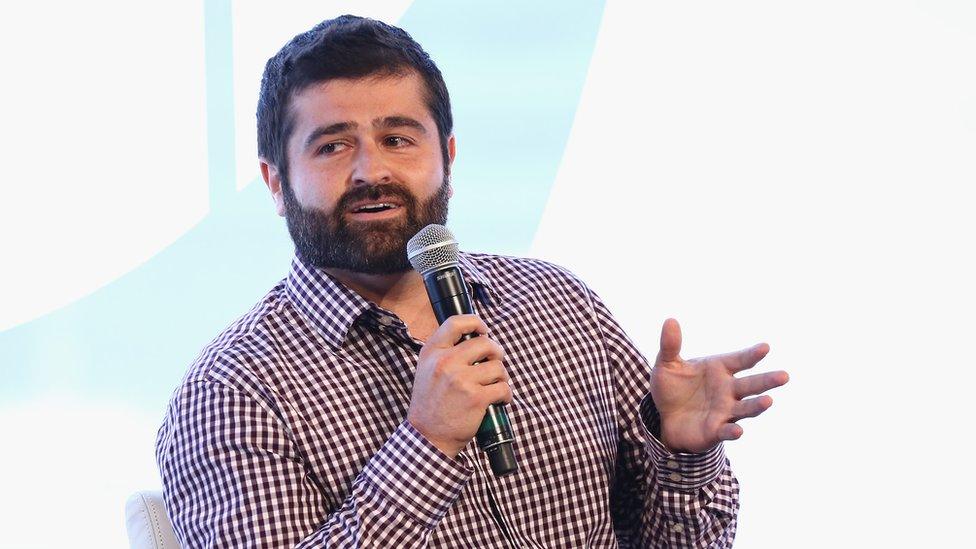Tech Tent: Net neutrality, new coins, and indoor farming
- Published

Stream the latest Tech Tent episode on the BBC website
Download, external the latest episode as a podcast
Listen to previous episodes on the BBC website
Listen live every Friday at 14.00 GMT on the BBC World Service
Is that vote to scrap net neutrality really a threat to the future of the internet? On Tech Tent this week we look at what happens now that the US has decided to get rid of rules which stop telecoms firms from discriminating between different forms of net traffic. We also hear from the crowdfunding site that's decided to join the Initial Coin Offering (ICO) craze and we find out why cheaper lighting technology is making indoor farming viable.
Net Neutrality - the endless battle
To campaigners who had fought long and hard for what they considered a founding principle of the internet, it's a disaster for freedom and creativity. To those who voted to remove the net neutrality principles brought in by the Obama administration it is a welcome end to burdensome regulation which threatened to harm the future development of the net.
Whether this is as hot a topic for millions of internet users is open to question. But the issue has been brought to a wider public by the comedian John Oliver, external on his US TV show - and if you want a clear explanation of the arguments look no further than this excellent BBC video.
Although this is particularly controversial in the US where 50 million people have only one broadband provider to choose from, it is a global issue. In India, Facebook had to withdraw a programme offering free access on mobile phones to some websites because it was seen as discriminating against those sites not included.
And the FCC's ruling does not mean the battle is over. New York's attorney general has already announced plans to co-operate with other states to fight the move in court. The Democrats seem convinced that net neutrality matters to young voters. Believe it or not, complex matters of telecoms regulation could become a key battleground in next year's mid-term elections.
Indiegogo bets on magic money

Rubin: Crypto-cash should not just be for the rich
The extraordinary surge in the value of Bitcoin has in turn created another investment boom in what are known as ICOs, Initial Coin Offerings where companies create their own virtual currencies to fund various projects.
While substantial sums are being poured into ICOs their reputation remains, not to put too fine a point on it, dodgy. Regulators have warned investors to be prepared to lose all their money.
But this week, crowdfunding site Indiegogo announced it would be adding ICOs to its portfolio of services.
"Investors are looking for vetted ICO opportunities," co-founder Slava Rubin tells Tech Tent.
When I put it to him that many saw these ventures as dodgy attempts to create magic money, he didn't argue with those descriptions. But he said Indiegogo would be carefully vetting the companies before putting just a selected few in front of investors.
In recent weeks, there have been stories of people taking out mortgages to invest in Bitcoin and there is surely a danger of similarly reckless behaviour as the ICO boom gathers speed.
But Mr Rubin says he is just trying to democratise this new investment opportunity: "I do not endorse mortgaging your home," he says, "but these opportunities should not be only for the rich."
The danger is that Indiegogo which has spent years trying build trust in crowdfunding, will see that good work undone if ICOs it has vetted go badly wrong.
But like many enthusiasts caught up in the excitement of the crypto craze Mr Rubin points to the early days of the internet boom as justification for optimism. He reckons that just as some great businesses emerged from the wreckage of the dotcom crash, so some winners will be born from the blockchain technology underpinning many ICOs.
Still, if Bitcoin crashes the ICO bubble is likely to pop too - and that could end up causing plenty of damage to the finances and reputations of those who have evangelised about our cryptocurrency future.
Lighting up the future of farming

Cheap lighting has helped to make more indoor farming a viable concept
As the world's population increases, yet resources become more scarce, and the need to cut emissions gets ever more urgent, could growing crops indoors in vast warehouses close to where they will be eaten help reduce the environmental impact of our food?
Lots of companies have tried this idea, but they've struggled to make the economics add up. Now a US startup called Plenty with $200m (£150m) in funding including investment from Jeff Bezos thinks it can succeed where others have failed.
Co-founder Matt Barnard tells us that the firm's warehouses can generate up to 300 times as much food as a conventional farm on the same footprint. Right now, they are growing salad leaves and herbs but have plans to produce strawberries, tomatoes and melons.
So what makes this work so efficiently? "It all stems from the fact that we fully control the plant's environment," he says. "We're able to give them ideal conditions, difficult or impossible to achieve in the field."
But he says this would not have been possible just a few years ago when the price of LED lighting was much higher: "To buy light would have cost 64 times more in 2010 than it does today."
He says the same pattern could be seen in the success of other technology advances - Google would have faced more than double the data storage costs if it had started a couple of years earlier, Tesla could not have got off the ground if battery costs had been much higher.
So Matt Barnard believes the time is right for indoor farming to transform food production. It's a bold claim but if he is right, a big prize awaits Plenty and its backers.
- Published14 December 2017
- Published14 December 2017

- Published14 December 2017